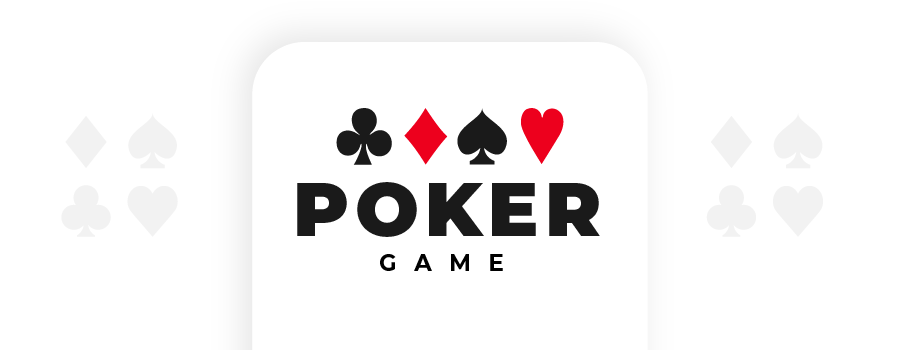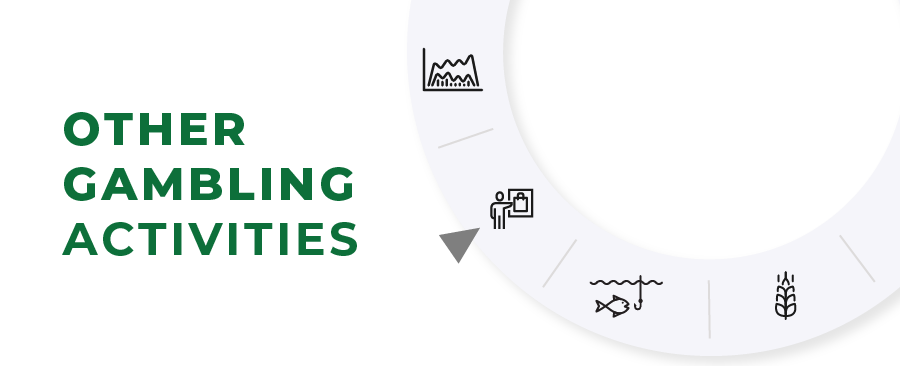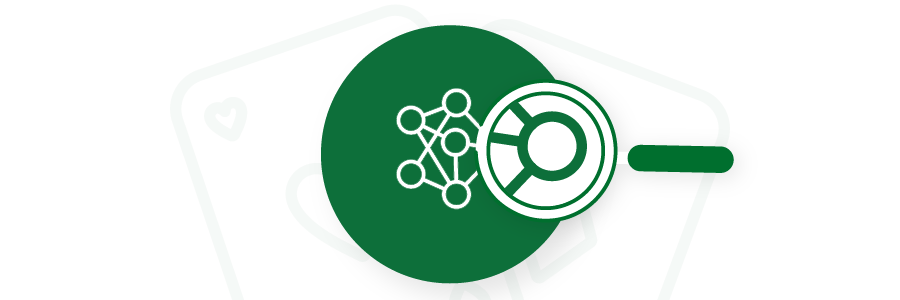Poker, a game of skill and strategy, often sparks debate: Is poker gambling? Explore the nuances and distinguish between skill-based play and pure chance.
Throughout the years, there has been a lot of public debate about whether poker should be legalized as a game of skill or considered and regulated just as all other forms of gambling.
This discussion is occurring, in one form or another, in just about every US state. It affects how and whether we in the US may legally play this game in public poker rooms, private residences and clubs, or even online.
This guide will look at the question of whether poker is gambling or a game of skill. And it will explore the question of its legality.
Here’s what you’ll learn:
Let’s dive in by having a look at poker in general.

Before we can answer whether poker is a game of skill or luck, let’s ensure we all understand exactly what the game of poker is all about.
Here’s a concise explanation.
Definition of Poker
Poker is often mis-defined as a card game played for money. It isn’t. Unlike bridge, Canasta, rummy, Euchre, or Cribbage, the cards, the hands, and the play of the hand in poker are but a tiny part of the game.
Poker is a gambling game played for money. The key to poker is knowing when and how to bet.
That’s what makes it unique. Without betting, there is no poker.
Brief History of Poker
Poker almost surely began as a gambling game in New Orleans in the early 19th century.
It spread up and down the Mississippi, as a way for gamblers to fleece unsuspecting travelers. In fact, it became known as “The Cheating Game”.
It spread further during the Civil War, from where it was brought back to every corner of the US (and all over the world).
The game's original version had players bet on their five-card hand, with no draw, straights, or flush.
A draw was added, and then a flush, and finally a straight, to liven up the game.
At the turn of the 20th century, stud poker was introduced. It too saw its popularity sore during a war – World War 1.
Hold’em was created in Texas in the 1950s and 1960s.
It spread rapidly once it became popular in the World Series of Poker in 1970.
By the 1990s, hold’em had become more popular than 7-Card Stud.
Texas Hold’em remains the most popular form of the game today, though Omaha, invented in the 1980s, is also becoming very popular.
Poker Today
Poker today is played everywhere. I’ve played it online and in all 50 US states, 9 provinces of Canada, and 29 countries.
Public poker rooms are legal and regulated in different ways in 39 states.
Poker may only be played legally in regulated poker rooms, part of large casinos in some states. In others, poker is only allowed in poker rooms, where a portion of the profits go to designated charities.
Some states have poker, but only on Indian land.
Other places make it legal for anyone to host a poker game, but the host may not “rake” it. Some states limit how much money may be wagered at any time; others limit the pot's overall size.
State laws regulating poker are a hodgepodge of many rules, regulations, limits, and requirements. There is no clear explanation of why or how these laws exist.
They just are.
To understand fully where and how poker is legal in the United States, you need to go state by state and read through every legislation and regulation.
The eleven states that don’t have legal public poker rooms, still have poker games. Poker is played extensively in homes and private clubs, both legally and illegally.
It’s also played in “free poker” games held in restaurants and bars, where players compete without cost to themselves for small prizes like free food or drink, and sometimes points that are added up and redeemed for seats in a freeroll tournament at the end of a playing season.
It’s been estimated that as many as 40 million Americans play poker regularly (though I’ve never seen any clear methodology for that estimate nor a good definition of what playing regularly means.)
There is no way to know exactly how many poker players there are since there is a requirement that poker players report their games or their activity, and there are often good reasons for poker players to keep their playing habits to themselves.
I can tell you this.
I have played poker in every state. But the illegality of it and the lack of universal public access to games makes it much more difficult to find a poker game in some states than in others.
Online poker is another matter entirely.
The 2006 Unlawful Internet Gambling Enforcement Act (UIGEA) was passed in the dead of night and attached to the Port Securities Bill without debate.
It makes it a federal crime to transfer money from a US banking institution to a gambling site – essentially cutting off the money needed to fund an internet poker site like Poker Stars.
This travesty of a bill and its rigorous enforcement beginning in 2011 caused all poker sites to stop doing business in the US, killing all internet poker in the US. (There are ways to get around these restrictions and prohibitions, but 99% of the pre-UIGEA traffic from the US was shut off).
Since that time, some internet poker has returned to the US, on a state-by-state basis. This has been allowed because of a UIGEA loophole allowing states to legalize internet poker for players within their state only.
To date, Delaware, New Jersey, Nevada, Pennsylvania, West Virginia and Michigan have passed laws allowing this.
Before we can answer the question, we need to understand what gambling is, and what is defined as a gambling act.
Let’s explore:
Definition of Gambling
Gambling is defined as the wagering of something of value on an event or occurrence with an uncertain outcome.
This may be completely random, like where a rolling ball will stop on a roulette wheel, what images will appear on a slot machine, or what number will come up when two dice are rolled.
But it may also be a wager on a skillful contest, like who wins a tennis match, or which football team scores more points.
The game may be skillful, but the bettor doesn’t know which skillful combatant or team will prevail. So the wager itself is considered gambling.
What Other Activities Are Gambling?
By this definition, many activities are gambling.

Financial investment is obviously gambling, as an investor’s profit depends on the uncertainty of markets.
So is the entire insurance industry gambling, based on the uncertainty of when a person dies.
Farming? Gambling, of course, as it is dependent on the uncertain weather and the market for what is produced. Oil, mining, fishing? All gambling, for the same reasons as farming. Anyone involved in sales is gambling, as the final decision, though usually prefaced by a skilled pitch, depends on the buyer's uncertainty.
You never know who or how many will buy your product.
The hospitality industry, including all restaurant and hotels, dependent as it is on the fickle decisions of unpredictable customers (not to mention the prices of commodities needed for the business), is undoubtedly gambling.
As such, people in those industries are gamblers.
All businesses, small and large, retail, wholesale, commercial, residential are, at least in large measure, gambling, as they depend on customers who are unpredictable and unreliable even in the best of times…not to mention their dependence on products whose costs are derived from the market, itself a cesspool of gambling.
Whom Else Is a Gambler?
By extension, all professions that depend, in whole or in part, on gambling industries, are themselves gambling.
The house detective for a casino is in the gambling industry even if they may never gamble.
The stable hand at the racetrack is a gambling employee, even if they do not bet. Harrah’s general counsel and their entire legal staff…same thing.
So too then are those professions who depend on the gambling industries of farming, insurance, hospitality, and business. Lawyers, accountants, architects, real estate brokers, who have them as clients are in the gambling industry, as they depend on the success of their clients for their livelihood.
Consumers of all types, dependent as they are on prices, set by markets they don’t control, are surely in the gambling business – even if their work is somehow outside of the scope of gambling.
Every time you decide to buy a loaf of bread or use a credit card or sign up for a cell phone or home internet plan you are gambling that the price you are agreeing to pay will be justified by the service or good you purchased.
By buying one product instead of another, you are making a decision based on the uncertain occurrence of whether or not you will be happier with one product instead of another, based on the price today instead of tomorrow.
What Isn’t Gambling?
It might be better to ask what isn’t gambling? Public employees weren’t listed above. But wait. They depend on tax revenue. And that is largely the product of the success or failure of the gambling business listed.
And it is surely dependent on the financial health of tax payers, whose payment of tax is the product of their income, derived from an industry that almost surely has to do with gambling, and their buying of products whose prices are set by markets that are, at their heart, centers of gambling on a huge scale.
Not to mention the public revenue that comes explicitly from gambling – like state lotteries, scratch tickets, and dedicated taxes from casinos and other gambling endeavors.
Schools are also funded by property taxes which are based on property values, which are the product of the …you guessed it…the housing market.
And markets, as we have seen, are centers of gambling. How much revenue will come in from property taxes in five years?
You may try to predict it. But the final number is definitely uncertain – as it is derived from figures that rise and fall, seemingly at random, and based on factors that defy accurate prediction.
That’s gambling! And so teachers, teaching assistants, librarians, guidance counselors and school administrators are all in the gambling business – whether they know it or not!
Retirees? Even those who never visit a casino, buy a lottery ticket, or play BINGO at the local house of worship are deep into the gambling industry.
Their 401K, 403b, SEP, IRA, Roth IRA, pension and even their Social Security are all heavily invested in one market or another.
And, as consumers, they participate in gambling every time they buy a loaf of bread. They’ve gambled and are gambling with their future quite literally.
In fact, based on my explanations above, I can’t think of a single person alive today who isn’t, in one way or another, a gambler!
Is Poker Gambling or a Game of Skill?
Different courts of jurisdiction have ruled differently.
Some have ruled that poker is gambling.
As such they have subjected poker to the same restrictions and limitations as other forms of gambling like crabs, roulette, and slot machines.
Other courts, notably in California, have ruled that poker (at least some forms of it) is a game of skill, and should be regulated as such, not as a gambling game.
There is no question but that poker is a game of skill. This is obvious to anyone who has played poker for a few sessions, or someone who has read at all about the game.
An unskillful player will almost certainly lose all of their money to a skillful player, given a long enough playing session.
While the unskillful player may win money by getting lucky; over time, the skills of the skillful player will prevail.
Do you have doubts about it?
Below, I set out the specific skills possessed by the seasoned and successful poker player, and show how those skills directly cause the good player to win money at the poker table.
1. Game Selection

Players get to choose their opponents. We may sit in one game instead of another, leave at any time, and move to a different game as our desire dictates.
Some games, and some opponents, are more likely to produce profitable results for the skilled player.
If you have any doubt, just think about the difference between playing against someone who has very little money and is very tight and skilled at poker as opposed to someone who hardly knows how to play the game and throws money away with abandon, and has plenty of it.
It’s easier to win money off of the loose player than the very tight short-stacked player.
Some players do not understand this, and sit down with tight aggressive sharks, when they would do better by sitting down with a table of deep-pocketed fish.
That’s clearly a skill that some have and others don’t have that will affect their bottom line.
2. Seat Selection

Players often get to choose their seat at the table.
They always have the ability to change their seat when a seat at their table opens up.
The knowledge of which seat is more likely to be profitable is a skill, similar to position – as is having the temerity to ask for and get the seat change when needed.
3. Changing the Quality of a Game
Some players, adept at the vital skill of influencing others, can transform some bad games into good games. They do this with the force of their personality, their conversation, and their own behavior at the poker table.
Consider the skill of salesmanship. Some people have a skill that allows them to sell products that other people, not possessing those skills, cannot sell.
The same is true at the poker table. Some players are good at inducing other players to commit money to the pot with a losing hand.
Other people, not possessing that skill, will win less money than those who have that skill.
Players who are good at improving the quality of the game get players to wager more and more loosely, with lower quality hands.
They get people feeling good about gambling, inducing them to willingly throw money into the pot even when they are very unsure about whether they’ll win.
That’s a huge skill.
4. Knowledge of Probability of Improvement

Not all hands have an equal chance of improving to winning hands at showdown.
Some players have more skill at determining which hands are more likely to become winners, based on the laws of probability. Those players, exercising that skill against those without that skill, are likely to win more money.
This is true throughout the play of a hand. There are four betting rounds in hold’em and Omaha; five in 7-card stud, Stud 8 and Razz.
Each betting round is a separate opportunity for those more skilled in understanding the laws of probability to extract money from those who are less skilled in this area.
5. Ability to Calculate and Compare Pot Odds to Drawing Odds

This is another skill that winning players exercise better than poor players. Starting and developing hands have a certain probability of improvement as the hand develops. Knowing this, and being able to calculate this as the hand progresses is a skill.
While this skill may not produce positive results on any specific hand; over time, the laws of probability are immutable and will reward those who understand them and bet accordingly. Some poker players are good at it.
Others are bad at it.
Those who are good at it can win money from those who are bad, demonstrating that their skill will produce definite financial rewards.
6. Self-Control

Some players have great self-control. They can act logically in all situations, betting with the odds, and refusing to take bad bets.
Other players let their emotions guide their actions. Even if they know that they have the worst of it, and are making a bet that will lose them money in the long run, they can’t resist the desire to play.
Or they lose control entirely, and throw their money away in paroxysm of emotional tirade (known as going on tilt).
Over time, those with little or no emotional control, will lose to those with self-control. That ability to control one’s behavior is a skill.
It wins money for those who exercise it.
7. Patience

In poker, it sometimes takes many hands for a good bet to present itself.
Some players cannot wait for those good bets, but instead give in to their desire to play, wagering sums on bad bets.
This lack of patience costs them money in the long run, as those who are patient, and who wait for good bets to arise, win money from the inpatient.
8. Overcoming Inertia

Sitting in a poker game can be very boring, repetitive, and mind-numbing. It’s easy to be lulled into a zone of robotic repetitiveness.
The skill player resists this tendency, and maintains their ability to find creative winning plays even after playing for many hours. The unskillful player, in this regard, becomes a creature of habit.
The skillful player resists habitual action, and responds to each hand’s unique qualities.
Similarly, a player who is overcome with inertia, does not remove himself from his situation, even if the quality of his game has deteriorated, or when his play has deteriorated. He stays too long, and changes tables too seldom.
The skillful player, adept at overcoming the inertia of rest, is regularly looking around for better games, and moving to them when possible.
9. Observation

Observation is a skill, honed with practice, and applied profitably at the poker table.
Some players notice little but their own cards. They base their betting decisions on the absolute value of their hands. For them, a pair of Jacks is a strong hand, Qh 7d is a middling hand. 7c 2d is a weak hand.
But the skillful player observes situations that make everything relative. He notices, for example, that his opponent is getting up for dinner. That makes it unlikely that he will call a raise unless he has a very strong hand.
Though our hero only has a 7c 2d (a weak hand for the unobservant, that would cause him to fold his hand); since everyone else has folded, and the final player, sitting after him, and yet to act, is stacking his chips, chatting with someone, and obviously about to leave, our hero raises.
Villain folds, and hero wins a small pot – strictly because he observed and took advantage of a situation a less skilled player would have ignored.
Poker games are filled with examples such as these. Observation is a skill that makes poker players money.
10. Knowledge of Other Player’s Tendencies

The ability to size people up is a skill. It’s a skill in the world of business; and it is a skill at the poker table.
Skillful players in this regard can get a strong sense of when and whether their opponents are strong or weak.
This knowledge can be exploited by the good player.
If I sense you are weak, I can get you to fold your hand with aggression, even if my cards are weak. This is clearly a skill that earns a profit for the skillful player.
11. Sociability – likeability

Ask any sales manager what skills he wants in a salesperson, and he’s likely to mention likeability. It is a skill useful in sales. It translates into money at the poker table as well.
Players who are likeable are less likely to have their opponents bet aggressively into them. They are less likely to be raised, less likely to be check-raised, and less likely to be trapped. While their good opponents won’t care about their likeability, their mediocre and worse opponents will.
When I play, I try to make friends with my opponents, as it will mute their aggressiveness when I am in a hand.
My likeability is a bankable skill.
12. Inquisitiveness

Good poker players often rely on their inquisitiveness to get an advantage. They find out things from their opponents just by asking. “Where are you from? What do you do for a living?” The answers can translate into profit for the skilled player.
Tourists tend to play differently than locals. A skilled player can turn those tendencies into profit.
Similarly, people of different professions tend to play their cards in different ways. An accountant is often someone who plays more tightly than a truck driver. A lawyer tends to bluff more than a teacher.
These things aren’t universally true, of course. But knowledge is power.
And the inquisitive player will generally end up with more exploitable knowledge about his opponents than the uninquisitive player.
13. Flexibility

Some players have the skill of flexibility. They may have a certain profitable style of play, but they can change it to meet a changing landscape.
See a game of very tight players?
A flexible player can loosen up his game and become more aggressive, bluffing more and winning more pots from players who fold incorrectly.
A rigid player, not able to change their style, would not take advantage of the same situation.
That is a skill.
14. Misrepresentation

Some players are much more skilled at misrepresenting their cards and themselves. Their opponents have a much more difficult time playing correctly against them, then playing against a routine and completely straightforward opponent.
The obvious example is the skill of bluffing.
Players who can skillfully add a number of bluffs to their playable hands will win more money against most player than those who only play high quality cards.
Similarly, players who are skilled at slowplaying their hand can often win huge pots that would have been smaller had they played their strong hands very aggressively from the start.
This misrepresentation is a skill that produces obvious and consistent dividends at the poker table.
15. Memory

Memory is a vital skill for the successful poker player. This is surely true in games with exposed individual cards, like 7-card Stud.
In that game, a skillful player can remember folded cards, giving them a much better knowledge of the remaining cards in the deck.
This skill allows them to better calculate the chances of improvement of their hand and the hand of their opponent.
It also helps them figure out the likelihood that their opponents are representing correctly the true strength of their hand.
Memory is also important in “closed poker” games like draw, Omaha, and Hold’em.
These games don’t require card memory, but rather a memory for how opponents behaved in similar situations.
If I am skilled in this regard, I might know that my opponent rarely if ever bluffs, or that they enter the hand pre-flop nearly 50% of the time, or that they never c-bet, or that they always bet on the river, whether or not they have a strong hand.
This knowledge is invaluable in making profitable decisions at the poker table.
Poker is a game of skill, with elements of luck. In that regard it is just like farming, insurance, hospitality, and any of a number of businesses or activities.
Someone who is hardworking and skillful will have an advantage over someone uninformed, lazy, or inattentive to detail.
Why should poker be treated any differently from other businesses? It seems obvious to me that the presence of these elements of gambling does not make an activity less legitimate.
It should not subject it to harsher laws or greater restrictions.
The restrictions on poker, that make illegal home poker games, or poker games in the back of a bar, restaurant or bowling alley, while allowing and even promoting a state lottery, scratch tickets, and sports betting, are obviously hypocritical.
Poker should be considered a legitimate form of entertainment, for adults, and should be allowed everywhere, with the same common-sense restrictions as you would apply to other adult activities like drinking or viewing certain movies.
Tax poker rooms, regulate them to insure that games are played on the square, and allow them!
Final Thoughts on Poker as a Game of Skill
Luck surely plays a part in the game of poker.
It is pure chance that determines which cards a player gets initially, and which cards are dealt to complete the hand.
But the winner in poker is not solely determined by the poker hands they are dealt.
In poker, there is betting. Betting gives players an opportunity to exercise decision-making.
Do they make a bet? How much do they bet? Do they call a bet made by someone else? Do they raise? Do they fold?
The correctness of their decision-making determines whether they win or lose.
So, is poker gambling? Well, the winning player will be the one who makes the most correct decisions – clearly a matter of skill.
If you want to become a skillful player, may I suggest you take a look at any of our many guides on the subject.

Bonuses
Casinos
Games
Academy
News
Shop
NEW Q&A
Sweepstakes



































